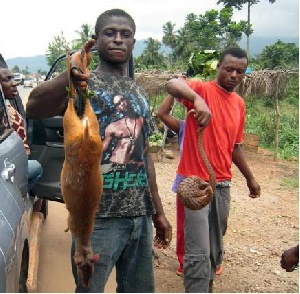It is almost common knowledge that wild animal meat sold in Ghana's major markets every year amounts to anything between 200 and 350 million dollars in revenue. Perhaps, what is unknown to many Ghanaians is that these revenues from the sale of grasscutter (akrantie), antelopes, rats, snails, birds, etc., rub shoulders with, and even outstrip annual revenues from timber and minerals.
The Forest Services Division (FSD) of the Forestry Commission (FC) has confirmed that in 2008 and 2009 timber fetched Ghana a total of 350 million dollars in each of the two years, comprising 250 million dollars export revenue and an estimated 100 million dollars for 400,000 cubic metres of wood consumed locally. But 80% of this wood is considered illegal.
And although gross mineral revenues may appear several times higher than what is realised from the sale of wild meat, actual revenues accruing to government from minerals is a paltry sum, almost half of what is realized from bush meat.
For instance, the 2009 budget and fiscal policy statement of the Government of Ghana states that total mineral revenues for 2008 amounted to about $2.3 billion. But, according to the Chamber of Mines, mining companies paid about GH¢180 million (about 5%) to the Government of Ghana in that year. Also, the United Nations Conference on Trade and Development (UNCTAD) in 2005 mentioned that out of the total mineral revenue of about $870 million generated in 2003, only $46.7 million, representing 5%, was retained in Ghana.
In both years, the bush meat revenue was estimated at between 200 and 300 dollars. Currently, about 384,000 metric tons of wild meat is estimated to be sold annually in Ghana. A study alluded to by the Wildlife Division of the FC indicates that the value of wildlife for an area of 30 square kilometers is US$140,000.
The worry of many is that all of the revenue estimated for wild meat is officially unrecorded. To say it differently, all the revenue goes into individual pockets due to loose regulation and monitoring. For instance, none of the individuals a traveler comes across on major highways such as the Accra-Kumasi road selling bush meat accounts for it by way of tax.
The only form of direct revenue accruing to the state is about GH¢100,000 per annum realized from game licensing. "What is recorded is game licensing...not the value of the catch," Mr Raphael Yeboah, Executive Director of the FSD, explained to yours truly in a recent interview.
Consequently, calls are coming from certain quarters for formalization and proper management of bush meat trade to ensure that government earns a substantial share of the revenue for development. This could lead to less reliance on timber trade, which in turn can help reduce deforestation. Statistics show that the forest cover of Ghana has reduced alarmingly from about 8.2 million hectares of land at the beginning of the 20th century to a mere 1.4 million hectares by close of 2007.
Daniel Owusu-Koranteng, Executive Director of Wacam, for example, opines that proper management of bush meat trade could inure to the benefit of the state. Hence, instead of perpetrating environmental degradation through surface mining and timber harvesting, it would be more profitable to place greater emphasis on wild animal meat trade, which is proving to be an equally rewarding sub-sector.
This could lead to better management of forests since the animals themselves would need the forests to thrive.
Certainly, his suggestion has not gone unchallenged. The first to consider the suggestion as untenable is Mr. Yeboah. He turns to Ghana's forest and wildlife policy to justify his disagreement. The policy recognizes both fauna and flora. Policy actions have resulted in the creation of specific protected areas which are for animals and plants. These have completely different premises or objectives for management.
"So, in the first place, to say that we should sacrifice one at the expense of another is not very good in the sense that what animals can do, maybe trees cannot do and what trees can do animals cannot do," Mr. Yeboah stressed.
Apart from that, it is believed that a significant chunk of bush meat comes from forest reserves and not from exclusively wildlife protected areas. This pre-supposes that "the more you open up the place and there are shrubs...the more animals can also come and breed."
Hence, "we strongly think that for maximizing the benefits of the forests, we should harmonise both the consumptive and non-consumptive use of the forests and as much as possible make sure that it is the excess growth that should be harvested," Mr. Yeboah points out, adding that for both animals and plants it is not advisable to over-harvest lest "you can also destroy their base ...it boils down to management."
This last point ties in with arguments put forward by biodiversity campaigners. They hold the view that bush meat trade is one of the most alarming threats to the survival of wildlife in West Africa and the main cause for the 'empty forest syndrome.'
Experts say Ghanaian forests are part of the Upper Guinean Hotspot, one of the 25 most biologically rich and endangered ecosystems in the world. In Ghana alone, there are 59 endangered mammal species, many of which continue to be offered in the market for bush meat consumption.
An existing mechanism for regulating the hunting of wild animals is the 'Close Season' initiative of the Wildlife Division of the FC. The 'Close Season' which usually falls between August and December is an annual ban on hunting and collection of wild animals. The period is said to be the breeding season of most of the animals.
Usually, a statement announcing the 'Close Season' would state that "During this period it shall be illegal for anybody to hunt, capture, or destroy any wild animal except the grasscutter (Akrantie), which can be done only under licence issued by the Wildlife Division of the Forestry Commission."
Even so, Mr. Yeboah admits that there is the need to reconsider the current regime of game licensing. "The permit points are so remote and far from the people; they would rather steal than travel to Koforidua and get a permit to kill one akrantie."
But ultimately, the solution lies in integrated management, Mr.Yeboah concludes.
General News of Friday, 14 January 2011
Source: Public Agenda
Bush Meat Gives Country More Revenue Than Mining
Entertainment












